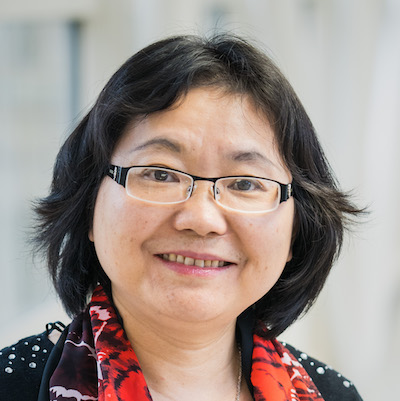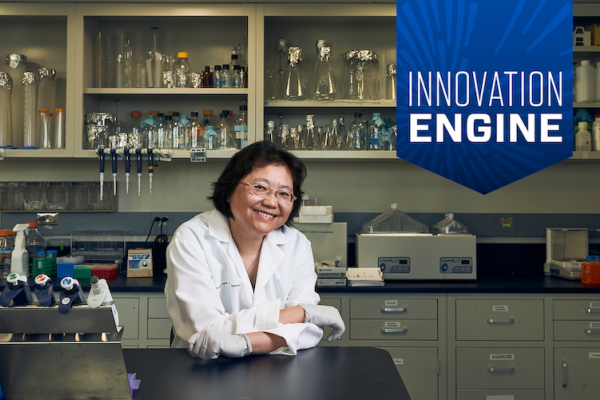Research Interests:
- Interactive effects of genetic and dietary factors on cancer treatment response and prognostic outcomes
- biological mechanisms of racial disparity in cancer aggressiveness
- identification of high-risk population and implementation of dietary intervention studies
Biography
Li Tang, PhD, is a Professor in the Department of Cancer Prevention and Control at Roswell Park Comprehensive Cancer Center. She is a molecular epidemiologist with a background in nutrition and cancer chemoprevention. She earned a Medical degree from TongJi Medical University in China, a Master’s degree in Nutritional Sciences from University of Arizona, and a PhD in Cancer Prevention and Pathology from the State University of New York at Buffalo. She completed postdoctoral training in Epidemiology at Roswell Park Comprehensive Cancer Center, and joined the faculty of Roswell Park Comprehensive Cancer Center in 2010.
Positions
Roswell Park Comprehensive Cancer Center
- Professor of Oncology
- Assistant Scientific Director
- Biorepository & Laboratory Services Shared Resource
Background
Education and Training
- 2006 - PhD - Cancer Pathology and Prevention - State University of New York at Buffalo, New York
- 2003 - MS – Nutritional Sciences – University of Arizona, Arizona
- 1998 – MD – Preventive Medicine - Tongji Medical University, China
Fellowship
- R25 postdoctoral training, Roswell Park Comprehensive Cancer Center
Professional Memberships
- American Academy for Cancer Research
Research Overview
Dr. Tang has a multidisciplinary education and training background in medicine, nutrition, cancer biology, and epidemiology. She conducts research in molecular epidemiology of cancer using both laboratory- and population-based approaches. Her research projects are developed in two directions, centering on enhancement of treatment efficacy and improvement of prognosis.
Dr. Tang utilizes multi-disciplinary approaches to understand how interactions of genetic and dietary factors determine responses to treatment and survival outcomes of cancer in the context of racial disparity. The primary focus is on cruciferous vegetables and their key anti-cancer effectors, the phytochemical isothiocyanates. Dr. Tang has conducted studies on the anti-cancer mechanisms, metabolism, and bioavailability of isothiocyanates in in vitro and in vivo models. She seeks to translate her laboratory findings in clinical and populational settings, in order to develop tailored dietary intervention approaches to improve cancer prognosis.
Dr. Tang is also interested in the genetic basis of racial disparity in cancer characteristics, in particularly cancer aggressive phenotypes. She has a project to investigate genetic variations in androgen transporters in relation to prostate cancer aggressiveness in African America and European America men. She also studies the role of human endogenous retrovirus in breast cancer risk and aggressiveness among African American and European American women.
Dr. Tang is a member of the American Association for Cancer Research and a standing member of NCI Career Development subcommittee. She has authored or co-authored over 50 journal publications, book chapters, and abstracts.
Featured on CancerTalk
Publications
- Tang L, Zhang Y. Dietary isothiocyanates inhibit the growth of human bladder carcinoma cells. J. Nutr. 2004, 134: 2004-2010.
- Tang L, Zhang Y. Isothiocyanates in the chemoprevention of bladder cancer. Curr. Drug. Metab. 2004, 5: 193-201.
- Tang L, Zhang Y. Mitochondria are the primary target in isothiocyanate-induced apoptosis in human bladder cancer cells. Mol.Cancer Ther, 2005, 4: 1250-1259.
- Tang L, Li G, Song L, Zhang Y. The principle urinary metabolites of dietary isothiocyanates, N-acetylcysteine conjugates, elicit the same anti-proliferative response as their parent compounds in human bladder cancer cells. Anti-Cancer Drugs 2006, 17: 297-305.
- Tang L, Zhang Y, Jobson HE, Li J, Stephenson KK, Wade KL, Fahey JW. Potent activation of mitochondria-mediated apoptosis and arrest in S and M phases of cancer cells by a broccoli sprout extract. Mol. Cancer Ther. 2006, 5: 935-944.
- Munday R, Mhawech-Fauceglia P, Munday CM, Paonessa JD, Tang L, Munday JS, Lister C, Wilson P, Fahey JW, Davis W, Zhang Y. Inhibtion of urinary bladder carcinogenesis by broccoli sprouts. Cancer Res. 2008, 68: 1593-1600.
- Tang L, Zirpoli GR, Guru K, Moysich KB, Zhang Y, Ambrosone CB, McCann SE. Consumption of raw, but not cooked, cruciferous vegetables is inversely associated with bladder cancer risk. Cancer Epidemiol. Biomarkers Prev. 2008, 17: 938-944.
- Ambrosone CB, Barlow WE, Reynolds W, Livingston RB, Yeh I-T, Choi J-Y, Davis W, Rae JM, Tang L, Hutchins LR, Ravdin PM, Martino S, Osborne CK, Abeloff M, Lyss AP, Hayes DF, Albain KS. Myeloperoxidase genotypes and enhanced efficacy of chemotherapy for early stage breast cancer in SWOG 8897. J Clin Oncol. 2009, 27: 4973-4979.
- Bhattacharya A, Tang L, Li Y, Geng F, Paonessa JD, Chen SC, Wong MK, Zhang Y. Inhibition of Bladder Cancer Development by Allyl Isothiocyanate. Carcinogenesis. 2010, 31: 281-286. Bhattacharya and L Tang contributed equally to this work.
- Tang L, Zirpoli GR, Guru K, Moysich KB, Zhang Y, Ambrosone CB, McCann SE. Intake of cruciferous vegetables modifies bladder cancer survival. Cancer Epidemiol. Biomarkers Prev. 2010, 19: 1808-1811.
- Tang L, Zirpoli GR, Jayaprakash V, Reid ME, McCann SE, Nwogu CE, Zhang Y, Ambrosone CB, Moysich KB. Cruciferous vegetable intake is inversely associated with lung cancer risk among smokers: a case-control study. BMC Cancer, 2010, 10: 162.
- Tang L, Yao S, Till C, Goodman PJ, Tangen CM, Wu Y, Kristal AR, Platz EA, Neuhouser ML, Stanczyk FZ, Reichardt JK, Santella RM, Hsing A, Hoque A, Lippman SM, Thompson IM, Ambrosone CB. Repeat Polymorphisms in estrogen metabolism genes and prostate cancer risk: results from the Prostate Cancer Prevention Trial. Carcinogenesis, 2011, 32: 1500-6.
- Geng F, Tang L, Li Y, Yang L, Choi KS, Kazim AL, Zhang Y. Allyl isothiocyanate arrests cancer cells in mitosis, and mitotic arrest in turn leads to apoptosis via Bcl-2 protein phosphorylation. J Biol Chem, 2011, 286: 32259-67.
- Yao S, Zirpoli G, Bovbjerg DH, Jandorf L, Hong CC, Zhao H, Sucheston LE, Tang L, Roberts M, Ciupak G, Davis W, Hwang H, Johnson CS, Trump DL, McCann SE, Ademuyiwa F, Pawlish KS, Bandera EV, Ambrosone CB. Variants in the vitamin D pathway, serum levels of vitamin D, and estrogen receptor negative breast cancer among African-American women: a case-control study. Breast Cancer Res. 2012, 14:R58.
- Tang L, Paonessa, JD, Zhang Y, Ambrosone CB, McCann SE. Total isothiocyanate yield from cruciferous vegetables commonly consumed in the United States. J Funct Foods. 2013, 5: 1996-2001. PMID: 24443655.
- Ambrosone CB, Young AC, Sucheston LE, Wang D, Yan L, Liu S, Tang L, Hu Q, Freudenheim JL, Shields PG, Morrison CD, Demissie K, Higgins MJ. Genome-wide methylation patterns provide insight into differences in breast tumor biology between American women of African and European ancestry. Oncotarget. 2014, 5:237-248. PMID: 24368439.
- Kwan ML, Lo JC, Tang L, Laurent CA, Roh JM, Chandra M, Hahn TE, Hong CC, Campbell L, Hershman DL, Quesenberry CP, Ambrosone CB, Kushi LH, Yao S. Bone health history in breast cancer patients on aromatase inhibitors. PLoS One. 2014, 9:e111477. PMID: 25354083
- Tang L, Zhang Y. Isothiocyanates in the chemoprevention of bladder cancer. Curr. Drug. Metab. 2004, 5: 193-201.
- Tang L, Zhang Y. Mitochondria are the primary target in isothiocyanate-induced apoptosis in human bladder cancer cells. Mol.Cancer Ther, 2005, 4: 1250-1259.
- Tang L, Zirpoli GR, Guru K, Moysich KB, Zhang Y, Ambrosone CB, McCann SE. Consumption of raw, but not cooked, cruciferous vegetables is inversely associated with bladder cancer risk. Cancer Epidemiol. Biomarkers Prev. 2008, 17: 938-944.
- Tang L, Zirpoli GR, Guru K, Moysich KB, Zhang Y, Ambrosone CB, McCann SE. Intake of cruciferous vegetables modifies bladder cancer survival. Cancer Epidemiol. Biomarkers Prev. 2010, 19: 1808-1811.
- Tang L, Yao S, Till C, Goodman PJ, Tangen CM, Wu Y, Kristal AR, Platz EA, Neuhouser ML, Stanczyk FZ, Reichardt JK, Santella RM, Hsing A, Hoque A, Lippman SM, Thompson IM, Ambrosone CB. Repeat Polymorphisms in estrogen metabolism genes and prostate cancer risk: results from the Prostate Cancer Prevention Trial. Carcinogenesis, 2011, 32: 1500-6.
- Tang L, Platek ME, Yao S, Till C, Goodman PJ, Tangen CM, Wu Y, Platz EA, Neuhouser ML, Stanczyk FZ, Reichardt JKV, Santella RM, Hsing A, Figg WD, Lippman SM, Thompson IM, Ambrosone CB. Associations between polymorphisms in genes related to estrogen metabolism and function and prostate cancer risk: results from the Prostate Cancer Prevention Trial. Carcinogenesis 2018, 39:125-133.
- Kwan ML, Kushi LH, Danforth KN, Roh JM, Ergas IJ, Lee VS, Cannavale KL, Harrison TN, Contreras R, Loo RK, Aaronson DS, Quesenberry CP, Tritchler D, Ghai NR, Quinn VP, Ambrosone CB, Zhang Y, Tang L. The Be-Well Study: a prospective cohort study of lifestyle and genetic factors to reduce the risk of recurrence and progression of non-muscle-invasive bladder cancer. Cancer Causes Control 2019, 30:187-193.
- Tang L, Zhu Q, Wang Z, Shanahan CM, Bensen JT, Fontham ETH, Smith GJ, Pop EA, Azabdaftari G, Mohler JL, Wu Y. Differential associations of SLCO transporters with prostate cancer aggressiveness between African Americans and European Americans. Cancer Epidemiol. Biomarkers Prev. 2021

